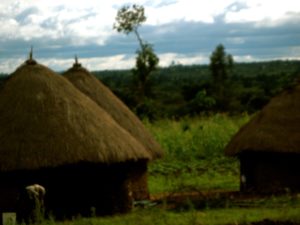There in the Africa savannah where flat-topped acacia trees dot the landscape, a young cattle-tender was seized by thieving attackers. He tried to seek refuge among his father’s herd, the bounty his assailants were after. The horrifying moments raced like short distance sprinters toward the finish tape until the boy was seized and beaten to death by these neighboring tribal warriors.
When I learned the news, words like heartless and senseless sprang to my young missionary mind.
In the thinking of the tribesmen who had slain the boy merely for his father’s cows, there was nothing senseless about their deed. For generations nomadic lore had dictated that all cattle were created by God as a gift for their people. Any and all means to retrieve what was rightfully ours was deemed justifiable. The retrieving of cattle was in fact, to them, a kind of duty.
Pastor Nathan was alerted of his young brother’s death by the high-pitched wailing of nearby village women. Afterwards, through the grapevine medium common to rural Africa, word of the tragedy made its’ way to our mission station some miles away.
I mounted my orange and aging Suzuki dirt-bike. With fidgety forefinger and thumb I ran my helmet strap through the cinch ring and secured it beneath my chin. Pastor Nathan needed a friend nearby – even a relatively new friend whose culture and land were much different from his own. I hoped to somehow be such a friend.
Aware of an involuntary tensing of my eyebrows, I tried to push back my growing sense of lack. Comforting loved ones who’ve experience the quiet and expected death of, say, an aged family member can be daunting enough. But this defied classification.
What will I say an hour from now once my piki-piki is brought to a dusty halt and I enter the humble, thatch-roofed hut? How do I myself digest such troubling news. How do I frame words to comfort a grieving young pastor whose brother just lost his life in this brutal way?
Bwana Ah-see fee-weh. Nathan, only barely my junior, offered a warm smile – greeting me with the Swahili words, “the Lord be praised”. Though the most common of greetings among believers, the words seemed unusual (maybe less than fitting?). We were near a tree at the elevated ridge of East Africa’s Great Rift Valley. The Lord be praised?
Nathan was a modest and gentle spiritual shepherd, entrusted with the care of a small Christian community. He had labored as pastor just under two years – this with little formal Bible training. But Nathan’s heart was rooted in Christ’s love and in his clear calling to serve.
We sipped hot chai and spoke in a softer, more subdued manner than usual. Finally I rallied my best voice to offer comfort. This would not be easy.
In unusual irony, Nathan sympathized with me in my struggle. His eyes conveyed compassion. He leaned forward in his simple, primitive-like chair. Its crude design was more suited for one given to half-reclining than to sitting.
Brother Jerry, he began, I want to say something.
It was my turn to lean in and listen.
I forgive these men who have done this thing. I forgave them actually once I learned of the sad event.
Was I hearing correctly? Not a trace of insincerity belied his calm, low voice. The faint tilting of my head along with some puzzlement in my look provoked him onward.
I know these people do not understand the badness of what they have done. They do not know. They do not understand. They need Jesus and I have begun praying for them that they should know him and gain his peace.
Listening to this humble shepherd-leader I was perplexed. I felt myself deeply moved. And I was suddenly aware.
I was aware of the presence of God. Here, just beneath the long grass weavings forming the roof of this Kuria home. I was seated in Solomon’s magnificent, newly-dedicated temple of the Living God. I was next to Isaiah, trembling at heaven’s voices crying Holy, Holy in the hallowed sanctuary. And the earthen floor under my feet might have easily dictated with hushed voice that I remove my shoes.
A reversing of roles had occurred. I, the missional teacher had come to give comfort. I sat voiceless now as the young, ill-educated, near-impoverished pastor had stepped up – so to speak – to his lectern. His non-sermon to me, this audience of one, conveyed with conviction and decisive action the message of an ancient, extravagant grace. Radical forgiveness issuing from one baptized in mercy.
The Lord be praised. Indeed.
©2015 Jerry Lout




 ***
***